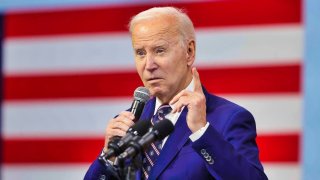On North Korea, Kamala Harris Would Be Joe Biden 2.0
Should Kamala Harris win the presidency, there is likely to be more continuity than there is change in U.S. policy toward North Korea. A new administration’s ability to initiate new approaches to North Korea will be limited by other foreign policy priorities.
The administration of President Joe Biden has tried to deter North Korea’s military adventurism by strengthening cooperation with U.S. allies and maintaining sanctions against Pyongyang, all while also leaving the door open for dialogue with North Korea as part of an effort to ultimately denuclearize the country.
Should Kamala Harris win the presidency, there is likely to be more continuity than there is change in U.S. policy toward North Korea. A new administration’s ability to initiate new approaches to North Korea will be limited by other foreign policy priorities, including the Israel-Hamas conflict, the Russia-Ukraine war, and the U.S. competition with China. However, if North Korea becomes a larger threat, particularly due to broader geopolitical events involving China and Russia, Harris may be motivated to make bolder changes to the U.S. approach.
There are certain parts of Biden’s North Korea policy that Harris is more likely than others to maintain. These include Biden’s emphasis on close cooperation with U.S. allies, which Harris supported as vice president. For example, when she visited the demilitarized zone in South Korea in September 2022, she reiterated the U.S. promise to defend the country, calling it an “ironclad” commitment.
Harris is also likely to maintain the United States’ long-term goal of achieving North Korea’s denuclearization. During her 2022 visit, Harris said that the shared goal of the United States and South Korea is to realize, “a complete denuclearization of the Korean Peninsula.” This came at a time when there was an ongoing debate in the policy community about whether the United States should maintain the goal of denuclearization.
Those who support a change to this policy goal say that the United States can only manage North Korea effectively if it accepts that the country will not denuclearize, while those against a change say that doing so would have negative consequences, including giving momentum to South Korean calls for nuclear weapons of its own.
Additionally, Harris is likely to continue to remain open to dialogue with North Korea without preconditions, even though North Korea has refused to engage with the United States during the Biden administration. However, such engagement is unlikely to include a leadership summit; Harris said at the Democratic National Convention in August that she will not “cozy up to tyrants and dictators like Kim Jong Un.”
An area where there could be some changes to Biden’s policy is where sanctions against North Korea come into play. The United States can no longer rely on the United Nations (UN) Security Council sanctions regime against North Korea, which has loosened considerably since 2018, due to Chinese and Russian support for North Korea. The United States is concerned about the growing cooperation between North Korea and Russia and could seek opportunities to work with like-minded countries outside of the UN framework to disrupt the ongoing cooperation.
In its partnership with Russia, North Korea has sent weapons to be used in the Russia-Ukraine war, while receiving benefits that likely include not only financial gain and Russian military technology but also more clients for its missiles and munitions.
Events that make North Korea a larger threat to the United States could change the trajectory of U.S. policy. In the past, such events were likely to involve North Korea acting alone. But increasingly, these threats are likely to involve broader geopolitical developments, such as deeper military cooperation with China and Russia that would allow North Korea to better coordinate with its two neighbors in potential conflicts. The North Korean threat is evolving; a Harris administration’s policy may be forced to adapt along with it.
About the Author:
Naoko Aoki is a political scientist at RAND who specializes in East Asian security issues.
Image Credit: Creative Commons and/or Shutterstock.

